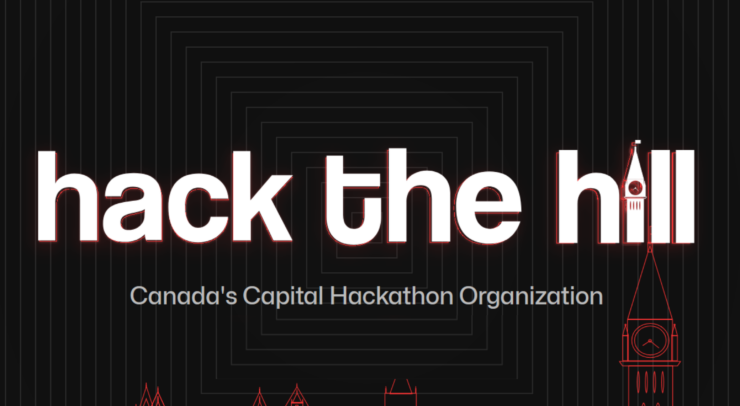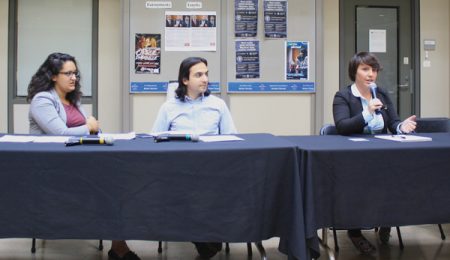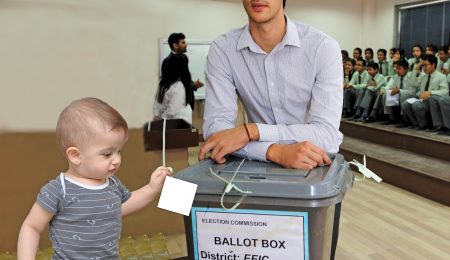Messy management and threats over referendum question make HtH’s future uncertain
If you’ve been on the unofficial U of O subreddit, r/GeeGees at all recently, you’ve probably heard of Hack the Hill. The student organization has come into the spotlight after submitting a referendum question in the 2025 University of Ottawa Students’ Union (UOSU) general elections, asking engineering students whether they would support a $5/semester levy to fund Hack the Hill events.
It was rejected by 89 per cent of the vote, with over 700 students voting.
However, in the days preceding the referendum vote, different online channels — including Instagram, Reddit and Discord — buzzed with screenshots, insults against the executive team, and claims of mismanagement. Members of Hack the Hill past and present were caught in the middle, either voicing their lingering frustrations, or correcting questions.
So what actually happened?
Hack the Hill and its Governance
Capital Technology Network (CTN) is a not-for-profit organization that hosts the Hack the Hill event. Originally created as an event co-organized by multiple student clubs from the U of O and Carleton with a simple goal in mind: to create a memorable hackathon for students near and wide at the University of Ottawa and Carleton University.
The first Hack the Hill hackathon held on campus was in the winter semester of 2023, after splitting from uOttaHack over alleged financial and personal issues between team members. Over 700 students from schools near and far had a memorable weekend in Learning Crossroads – so the team decided to formalize their establishment as Hack the Hill.
Capital Technology Network has been incorporated as a registered Canadian not-for-profit organization since August 2023. The federal government defines a not-for-profit organization as clubs or societies that “are not charities, are organized and operated exclusively for social welfare, civic improvement, pleasure, recreation, or any other purpose except profit”.
Daniel Thorp has been a key member of Hack the Hill for over a year, serving in different capacities such as development director and eventually, president from June to October 2024. After finishing his term as president, Thorp remains on the CTN board as vice-president operations.
Thorp told the Fulcrum that the organization wanted to be able to maintain flexibility in hosting joint events on both the University of Ottawa and Carleton University campuses, as their event attendees and team members come from across Ottawa. The not-for-profit structure was suggested, as opposed to a singular club, to allow Hack the Hill branches to meet student club requirements at each campus, while remaining a part of the overarching Capital Technology Network organization.
“It didn’t make sense to split our operations between those two schools, but it did make sense to split some of our financial [and] administrative [duties] between those schools,” he said.
Not-for-profit organizations are also eligible for federal grants and certain tax exemptions.
Planning for Hack the Hill begins about a year in advance and there are several different titles available for students who wish to join the Hack the Hill team: co-ordinators, directors-at-large managers, vice presidents and a (singular) president. Teams such as partnerships, design, development and logistics work together to secure on-campus space for the hackathon, partnerships, and design attendee gear — all tasks that must be prepared months in advance.
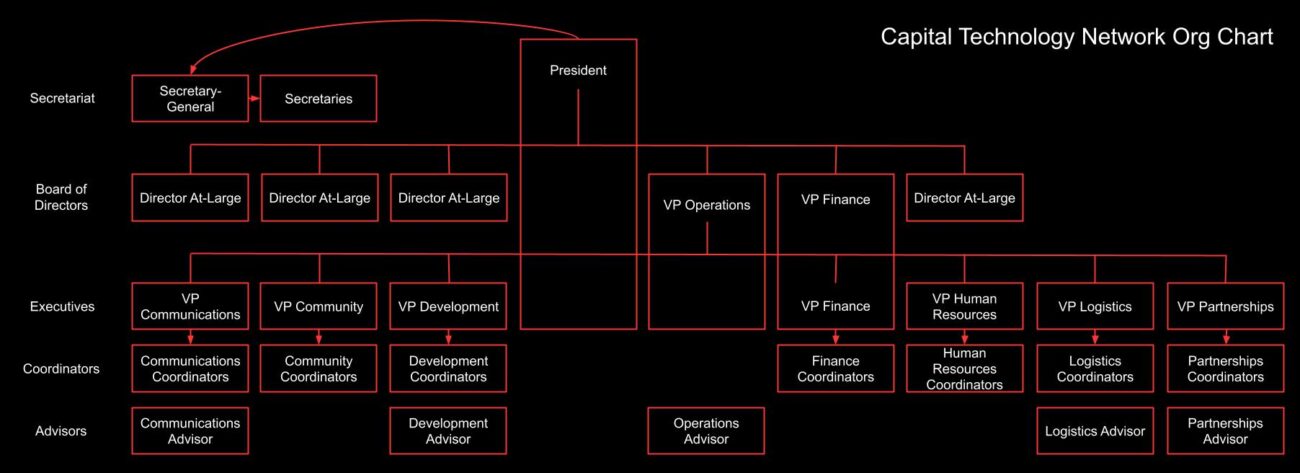
On paper, helping organize Hack the Hill seems like a great opportunity to add to your resume: make new friends, get involved in the student community, network with high-profile industry reps, and work with different teams. But in reality, it was a far different experience for many.
What are complaints about?
Editor’s note: Both Michael and Laika’s names have been changed, out of concern for professional backlash and protection of their current jobs.
Laika was a computer science student who joined the Hack the Hill team in May 2023, shortly after participating in Hack the Hill I.
They had a great time, had friends who had joined and wanted to be more involved, so they started in the design team, quickly becoming a coordinator. Then, in January 2024, they were elected director of the team and oversaw a group of six to seven other students.
“It was fun at first. This was back when the organization’s scope was not as big as it currently is,” said Laika. “While I was on the team, my director didn’t really run meetings or stuff like that, so I was just picking up jobs as they came to me — which is fine for a student, or that is low commitment. But I felt a little dissatisfied with the fact that we didn’t really seem to have a big structure as a team.”
Michael was another computer science student who also joined Hack the Hill shortly after participating in the hackathon in 2023. Feeling excited and motivated by other friends who were a part of the team, they joined as a part of the community team, which organized social events on behalf of the organization.
“I would argue this is the most important point, [but] you need time to gather sponsorships. You need time to talk to people about catering if you’re a big enough hackathon, as well as getting merch design done, ordering it in time because a lot of people will ship it from overseas,” Laika explained.
But both Michael and Laika believed that the organization was growing too large too quickly.
Laika, as head of the design team, felt overwhelmed by the tasks demanded of the organization from them, especially since they didn’t feel properly onboarded. They also did not feel as though their work was properly respected.
“At this point, I wouldn’t necessarily blame it on any specific person. I would just say that the team was trying to do way too many things. I, as design director … I was being asked almost daily, on a weekly basis, we would be posting almost every day to advertise events.”
“The fledgling directorship team did not expect there to be so much responsibility suddenly hoisted on us. Suddenly, I was in charge of not only social media posts, but also the UI of the website, the hacker booklet that is given to students, the merch design, and the design of [HackHers]” Laika explained.
“If I was told ahead of time that I had to devote that much of my time for that work — because also, directors meetings ran weekly — I don’t think I would have chosen to become a director.”
As for Michael, who joined because his friends were a part of Hack the Hill and became close with his team, he felt the opposite — his team’s workload was light, yet often disrespected by some directors.
“There was this one period of time in January 2024 where we had a community event once per week in that month, which is way too often,” he said. Michael explained that the community’s interim director overwhelmed the team with events, before the community team elected a new director.
“I was listening in on a directors meeting once and somebody fully said, ‘we need to stop running so many dogshit events’. Fully disrespecting the community team and my director fully … called him out on the disrespect,” Michael recounted.
Hack the Hill II was originally planned for the winter semester of 2024, but that date was delayed until the fall semester, due to multiple issues. HackHers, a much smaller hardware-based event for women and gender-diverse students, was held in the winter semester instead.
“Originally it was financial issues, [and] we were worried about not having enough money for the hackathon, so we postponed it.” said Thorp. “Another big reason we postponed it was we wanted to move away from the uOttaHack date, since their events are always in the winter. So we moved it to the fall [semester].”
Thorp said in an interview that the team had come to this conclusion in October, but Michael didn’t learn this until a few weeks before HackHers.
“We wanted to have Hack the Hill II be [in February] … but then the [directors’ team] felt that we weren’t ready, so we had an all-hands meeting where they pitched that maybe we should … postpone the hackathon up to September.”
“I fully didn’t know that HackHers was happening until it was pretty close to happening, if I recall correctly. Then we [the community team] had to come up with a couple of ideas for events that we could run during [HackHers].”
There also appeared to be internal issues of power dynamics and bureaucracy amongst the team.
Laika recounted feeling very jaded after leaving Hack the Hill II in October, as did many of their friends.
“I was not able to leave the day after the hackathon. Apparently in the [policies manual], I cannot leave until I’ve made my off-boarding documents for the next director. So I got to leave two weeks later, I think it was … later in October.”
”It was a big point of relief when I finally got to leave because it took up a lot of time.”
Certain members of Hack the Hill also don’t understand the complications — legal and political — of being a not-for-profit organization. Thorp said these reservations were addressed, but Laika and Michael believe that the knowledge gap regarding the not-for-profit status platformed other members who did — and feeds into those power dynamics.
“This was also a point of contention, the fact that there is so much bureaucracy and the fact that the organization is a not-for-profit, which I’ve always disagreed with.” Laika said. “I think part of being a not-for-profit was that there was a legal aspect to a lot of things that only some people on the team know how to navigate, and thus inadvertently, they held more power over a lot of other people on the team who don’t know how the legal part works.”
Michael agrees that the team structure of CTN was “much too large and extremely vertical”. He also felt like much of the leadership were in a clique, leaving coordinators in the dark about certain information.
“A lot of the time, it felt like I didn’t know what was going on. I mean, I’m one of the lowest [ranked] people on the hierarchy, but I feel like there are important things that everybody should know — and I didn’t know them.”
This criticism led Thorp to rename the director positions on every team to vice presidents, making it optional for those people to be part of the Board. The organization’s current board is comprised of the president, vice president finance, vice president operations, and directors-at-large. Thorp believes that this change “allowed people who don’t have an interest in policy and governance to stay out of it.”
Thorp was aware of continued disagreements in governance strategies, but emphasized to the Fulcrum that the time spent on policy issues was worth it.
“So some people … leave the organization with some sort of frustration around our policies or whatever else, but the policies are not there to be cumbersome and to be frustrating; they’re there to make sure things are structured.”
Yet, some members believe those changes weren’t enough. A founding member of Hack the Hill, BravE, wrote on Discord on Feb. 2: “(some of) the directors decided to focus on Hack the Hill being their pet project to be able to experiment with policy and planning.” The following is an excerpt from the same message:
The Fulcrum found no evidence of the alleged “mismanagement of funds,” but criticism of the organization’s size was a common thread in interviews with members.
As a result of perceived power dynamics and burnout, the team experienced large-scale turnover. As of February 2025, only six of the 75 members involved in October 2024’s Hack the Hill II remain.
Thorp explained the high turnover as: “…people were just leaving and not joining. And the reason for that was we didn’t really want to hire; partially for public perception reasons and partially just for onboarding purposes … we didn’t want to hire people [so] close to the hackathon.”
2024 Data Breach
On the afternoon of July 30, 2024, Hack the Hill experienced a major data breach through an alleged ransomware attack, demanding 0.0121 bitcoins (valued at approximately $1100 CAD at the time) for the exposed information. The data for fifty students who had applied for Hack the Hill II was affected, which included their phone numbers, email addresses, and emergency contacts. The data breach occurred due to a change in platform hosting for hackathon participants’ information.
According to Thorp, he found out about the breach through a staff member’s text message that the website was down. He messaged a former Hack the Hill member, asking for help as dealing with the attack was “outside [his] comfort zone,” but was politely refused, as the member was concerned about liability. A text exchange where Thorp then asks the former member to run a “penetration test” — a simulated cyberattack to evaluate the security of a system — on the website is shown below.
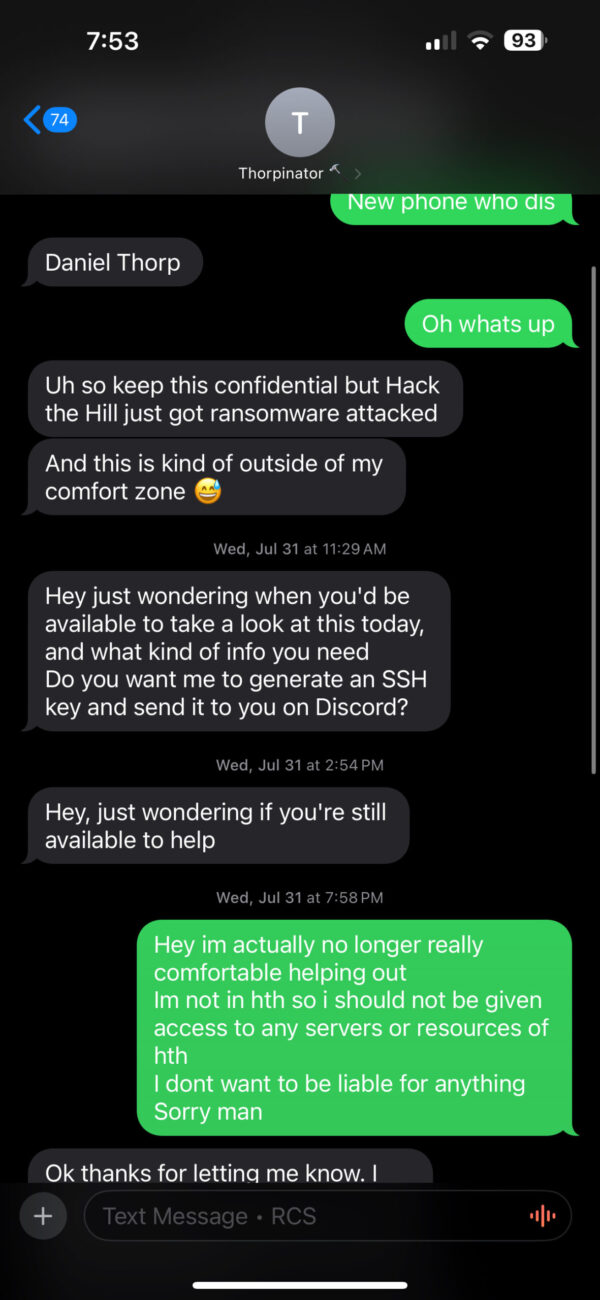
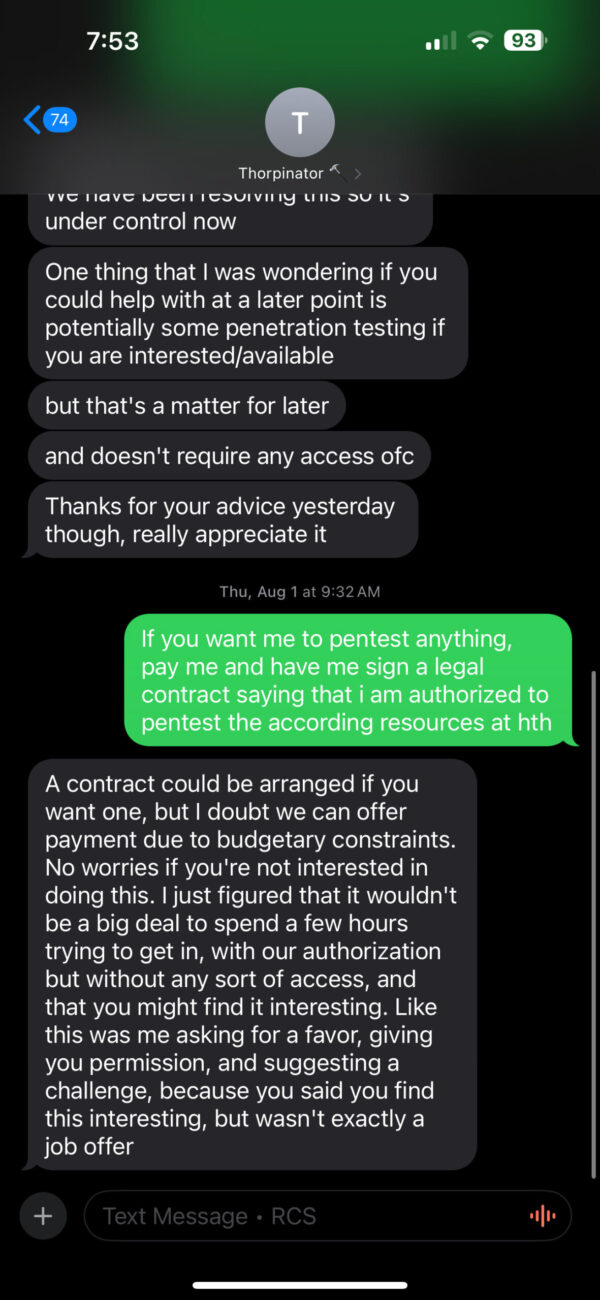
A text conversation between Thorp and an non-member of HtH posted to Discord.
The breach was resolved approximately two hours later, with the help of an unnamed cybersecurity firm, who offered unofficial advice at the request of a CTN director, who was interning at the firm. CTN also decided not to pay the ransom. Once the issue was fixed, CTN reached out to UOSU’s legal counsel, and contacted multiple law enforcement agencies, including the Canadian Centre for Cyber Security, the RCMP, and Ottawa Police Services.
According to Thorp, an email alerting the students affected by the data breach was sent out the following day — a timeline that was constrained because of the difficulty in finding the affected students’ information and the end of UOSU’s legal counsel’s work hours.
UOSU president Delphine Robitaille confirmed this sequence of events.
As a result of the data breach, Major League Hacking (MLH) — a for-profit company that helps student groups with the logistics of organizing hackathons— was not affiliated with CTN for Hack the Hill II.
According to Thorp, CTN had applied for and almost secured an affiliation with MLH when MLH requested that CTN switch the platform they were using for applications. The “unreasonable” request, Thorp said, made CTN take a step back.
The Fulcrum found no evidence of direct financial loss to CTN as a result of the data breach.
Why submit a referendum question?
Thorp explained that a referendum question was the best option to maintain the scale of events that the organization has hosted. The second edition of Hack the Hill, which ran from Sept. 27-29, 2024, cost $74,813.17, with an additional $19,128,21 in operating expenses. It was funded primarily through donations, corporate sponsorships, and the Engineering Endowment Fund. In contrast, HackHers cost $2,686.48.
When asked by the Fulcrum why the organization proposed a referendum question instead of making Hack the Hill a paid event, current HTH president Eric Eaton responded “…generally hackathons are not paid events.” He also noted that he was the deciding vote in favour of pursuing the referendum question route.
Thorp believes that the barrier caused by charging an event fee would not only be inequitable, but would also disqualify CTN from certain sponsorships, including a non-financial affiliation with MLH. This future partnership would require Hack the Hill to be free of charge.
CTN held an information session regarding the referendum question on Feb. 3, a day before the general election voting period began. The event was filled with concerned — and some, spiteful — students who were confused by the referendum question or its implications.
A Reddit post published on Feb. 1 alerted students regarding the referendum question and the subsequent information session, claiming that Hack the Hill wanted to “reap $54,000 from all engineering students and all [computer science] students”.
There was also a Notion webpage that collected screenshots of multiple conversations occurring in the U of O’s Computer Science Club Discord server, regarding the reasoning behind the fee, the previous Hack the Hill data breach, and miscommunications over the organization’s financials.
Recorded and published on YouTube, the hour-long session featured students asking questions to the Hack the Hill team. Many were genuine, such as asking about what the referendum question would be used towards, how the opt-out option would work, and why the fee is charged to U of O students when Hack the Hill is planned in collaboration with Carleton University students.
Although the Hack the Hill team was responsive, the questions were not fully answered.
But others were aggressive, asking why the club felt entitled to student funds and pressed the team for details about the 2024 data breach. Different executives of CTN tried to answer the audience’s questions, but also recognized that many attendees held resentment towards the Hack the Hill team for different reasons.
The current executive team mentioned that there was hesitation about sharing meeting minutes about the referendum question — and even advised Thorp not to attend the session — regarding safety concerns over the fee.
Thorp recounted receiving a wide range of harassment, ranging from threats to his physical safety to discriminatory insults. “There were a lot of different things being said. But honestly, the main thing for me was just the threats — those were the most scary. Those were the things that made me feel like I wasn’t safe on campus anymore.”
Thorp later told the Fulcrum, “Because of the fact that I was unable to make it and because of the fact that some other members of the team are newer, unfortunately I feel like we didn’t do a very good job of answering questions.”
Laika, who was in attendance at the info session and asked questions, believed that the Discord discussions were the referendum’s “full downfall.” “It devolved into people talking to current members of the team, and getting really angry at this specific person, asking leading questions, getting answers that were taken out of context and being like, ‘aha!’”
Financials
The Hack the Hill Instagram post says that the five-dollar fee would “help fund the Hack the Hill hackathon and community events”, and it would “ensure stable funding for Hack the Hill and other initiatives”.
Typically to fund hackathons, organizers rely on donations from industry leaders and relevant technology businesses. In the past, these included corporations such as Canadian Tire, Blackberry, Google, Red Bull and Fantuan. According to the HtH financial documents, $14,000 was raised in sponsorships for Hack the Hill, and $7,415 was raised for HackHers.
In addition to varying donation amounts from high-profile businesses to host their hackathons, Hack the Hill receives funding from U of O registered student governments (RSGs) to support their community events and club activities.
As a sub-association of the Computer Science Students Association (CSSA), Hack the Hill receives funding from the RSG. Hack the Hill is also a registered UOSU student club, which qualifies them for club funding. They are also eligible for receiving funding from the Engineering Endowment Fund, which is designed to help different student clubs and events within the Faculty of Engineering.
Notably, the Engineering Endowment fund is listed as one of uOttaHack’s main sponsors. According to the HtH profits and loss document, Hack the Hill received about $20,000 over three semesters from the Engineering Endowment Fund, including several reimbursements.
Hack the Hill also received $1000 from the Carleton Systems and Computer Engineering Society, presumably when their presence on the Carleton campus was greater.
What also sets Hack the Hill apart from other hackathons is that they reimburse travel fees for attendees who wish to attend from outside the Ottawa area, on top of providing food and workshops. For HtH II, $3,987 was spent on travel reimbursements for participants.
There have been claims that Hack the Hill raised $64,000-95,000, leading to allegations of financial mismanagement. “The way we were able to run [Hack the Hill II] was largely because we waited a year-and-a-half. If we had just held the hackathon in the winter, we wouldn’t have enough money,” explained Thorp.
Thorp added that many critics of Hack the Hill have been confusing “debt” with “deficit”, reiterating that their financials are sound. “Deficit was a good thing for us because deficit was something we needed to have to get rid of reserves that we shouldn’t be having. I just didn’t understand the way that people are presenting this issue, because it’s not debt.”
What’s next for Hack the Hill?
With its unsustainable expenditures, infighting, and intense backlash from the student community, Hack the Hill’s future remains uncertain. Current and former executives are split on where CTN should go from here.
BravE (Discord, Feb 2, 2025) : “I genuinely hope for the sake of the students that HtH in its current state ceases to exist (whether it be by dissolution, merging, or a strong change in operational policies and culture.)”
“I think that…Hack the Hill [should have] a smaller team, stick to running one or two events a year aside from the hackathon, and try to rebuild slowly — because it’s just way too unsustainable,” said Laika.
Despite the negative spotlight on the team’s activities, Eaton told the Fulcrum that they “still intend to do a hackathon in the fall semester.” CTN also has two more events planned this semester, the next of which is an escape room design workshop this coming Thursday.
On Feb. 11, CTN executives met to discuss the failure of their referendum question. Thorp told the Fulcrum that the meeting focused on key takeaways and improvements for the future. The Board “discussed strategies to improve [their public relations, reaffirmed [their] commitment to hosting Hack the Hill III, and discussed how we can create a budget for next fiscal year that ensures the event remains financially sustainable while maintaining a high-quality experience for attendees.”
Although many hold resentment towards CTN and grief over how it operates and the way the referendum question was posed, there are just as many who still maintain hope that the club can be as passionate and inviting as it appeared to be when they first joined. How they utilize this passion is up to the organization.
- Editor’s Note: this article was updated at 10:02 p.m. on Feb. 24. The initial version of the article referred to Daniel Thorp as development designer instead of director, and that Thorp stepped down as president instead of his term ending. Finally, it mistakenly said that as a not-for-profit charity, CTN could issue donation receipts.

